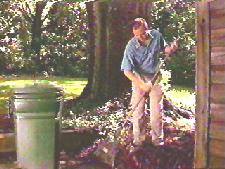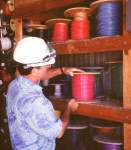|
Who Is at Risk of Getting HPS and Why?
Anyone who comes into contact with rodents that carry hantavirus
is at risk of HPS. Rodent infestation in and around the home remains
the primary risk for hantavirus exposure. Even healthy individuals
are at risk for HPS infection if exposed to the virus.
What Kind of Activities Are Risky?
 Any activity
that puts you in contact with rodent droppings, urine, saliva, or
nesting materials can place you at risk for infection. Hantavirus
is spread when virus-containing particles from rodent urine, droppings,
or saliva are stirred into the air. It is important to avoid actions
that raise dust, such as sweeping or vacuuming. Infection occurs
when you breathe in virus particles. Any activity
that puts you in contact with rodent droppings, urine, saliva, or
nesting materials can place you at risk for infection. Hantavirus
is spread when virus-containing particles from rodent urine, droppings,
or saliva are stirred into the air. It is important to avoid actions
that raise dust, such as sweeping or vacuuming. Infection occurs
when you breathe in virus particles.
Opening and Cleaning Previously Unused Buildings
Opening or cleaning cabins, sheds, and outbuildings, including barns,
garages and storage facilities, that have been closed during the
winter is a potential risk for hantavirus infections, especially
in rural settings.
Housecleaning Activities
Cleaning in and around your own home can put you at risk if rodents
have made it their home too. Many homes can expect to shelter rodents,
especially as the weather turns cold. Please see our prevention
information on how to properly clean rodent-infested areas.
 Work-related Exposure Work-related Exposure
Construction, utility and pest control workers can be exposed when
they work in crawl spaces, under houses, or in vacant buildings
that may have a rodent population.
Campers and Hikers
Campers and hikers can also be exposed when they use infested trail
shelters or camp in other rodent habitats.
The chance of being exposed to hantavirus is greatest when people work,
play, or live in closed spaces where rodents are actively living.
However, recent research results show that many people who have
become ill with HPS were infected with the disease after continued
contact with rodents and/or their droppings. In addition, many people
who have contracted HPS reported that they had not seen rodents
or their droppings before becoming ill. Therefore, if you live in
an area where the carrier rodents, such as the deer mouse, are known
to live, take sensible precautions-even if you do not see rodents
or their droppings.
|

 National
Center for Infectious Diseases
National
Center for Infectious Diseases National
Center for Infectious Diseases
National
Center for Infectious Diseases